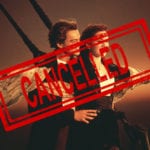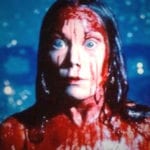 Crime
Crime  Crime
Crime  Animals
Animals The Animal Kingdom’s 10 Greatest Dance Moves
 Movies and TV
Movies and TV 10 Box Office Bombs That We Should Have Predicted in 2025
 History
History 10 Extreme Laws That Tried to Engineer Society
 History
History 10 “Modern” Problems with Surprising Historical Analogs
 Health
Health 10 Everyday Activities That Secretly Alter Consciousness
 History
History Top 10 Historical Disasters Caused by Someone Calling in Sick
 Animals
Animals 10 New Shark Secrets That Recently Dropped
 Movies and TV
Movies and TV 10 Forgotten Realities of Early Live Television Broadcasts
 Technology
Technology 10 Stopgap Technologies That Became Industry Standards
 Crime
Crime 10 Dark Details of the “Bodies in the Barrels” Murders
 Animals
Animals The Animal Kingdom’s 10 Greatest Dance Moves
 Movies and TV
Movies and TV 10 Box Office Bombs That We Should Have Predicted in 2025
Who's Behind Listverse?

Jamie Frater
Head Editor
Jamie founded Listverse due to an insatiable desire to share fascinating, obscure, and bizarre facts. He has been a guest speaker on numerous national radio and television stations and is a five time published author.
More About Us History
History 10 Extreme Laws That Tried to Engineer Society
 History
History 10 “Modern” Problems with Surprising Historical Analogs
 Health
Health 10 Everyday Activities That Secretly Alter Consciousness
 History
History Top 10 Historical Disasters Caused by Someone Calling in Sick
 Animals
Animals 10 New Shark Secrets That Recently Dropped
 Movies and TV
Movies and TV 10 Forgotten Realities of Early Live Television Broadcasts
 Technology
Technology 10 Stopgap Technologies That Became Industry Standards
Top 10 Greatest Movies To Win Best Picture
A few weeks ago, I created a Top 10 List of what I think are the worst films to “win” the Academy Award for “Best Picture.” The terrific website ListVerse was kind enough to pick it up and what followed was a barrage of comments (over 400+ in less than 48 hours) that were great fun to read. Comments ranged from highly complimentary to others that were, well…not so nice and aimed at yours truly. No matter. That is what is such fun about these lists and what I was hoping for when I began my Magic Lantern Film Blog — a place for film lovers to speak passionately about the films that they love, and hate, a place where people can have healthy debates with one another…quite simply, a place for movie geeks like me to communicate. A handful of those commenters suggested that rather than be so negative, that I create a Top 10 List of those “Best Picture” winners that I found to be the most deserving. I thought that was a fair point and that is what you see here – The Top 10 Greatest Movies to Win the “Best Picture” Oscar!
This list was a bit easier for me to compile, especially the Top 3. What I found to be most difficult was trying to squeeze in so many wonderful films that took home the award, in just ten slots. Sadly, a few of them didn’t make the cut, though I wish there was more room. My criteria? Well, first it has to be a superb, timeless movie; a film that, looking back, you can still tell that it was the best in that respective year. A movie that, if it didn’t win “Best Picture,” you’d say, “Really? That didn’t win?”. Second, it had to be (in my opinion) the best of the films nominated in that year. If I thought another film was better, then it didn’t make the list (i.e. I think “JFK” is far superior to the victorious ”Silence of the Lambs“). Finally, I looked at the competition each winning film faced, and what the movie had to beat out (have you ever looked at all the fantastic films battling it out in 1939?). When all was said and done, I came up with these 10 magnificent Oscar-winning films. I hope this brings just as much reaction and discussion as the previous list.
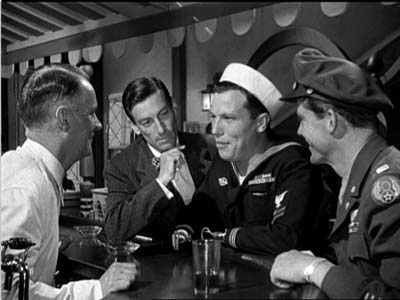
Wyler made some truly unbelievable films (“Mrs. Miniver,” “The Heiress,” “Jezebel” and the Oscar-winning “Ben-Hur” which could have easily made this list), but for some reason, few cite this one as being one of his greatest. I first saw this film only three years ago and was completely blown away by it — and the war-film genre is not one of my favorites. Winner of 7 Academy Awards, this is the film that beat out “The Yearling” and the classic “It’s A Wonderful Life” and, in my mind, deservedly so. The movie centers on three WW II veterans who come home to Smalltown America from the war, only to find that everything has drastically changed. Wyler and screenwriter Robert E. Sherwood aren’t concerned with showing us any scenes of the men in battle, but are wholly invested in showing us the crisis that each man faces upon his return. Sixty years later, the movie leaves a lasting impact on its audience and the cast is stellar. Frederic March won an Oscar for “Best Actor”, and Harold Russell, who plays Homer, a man who lost both hands during the war, won “Best Supporting Actor” — both great to watch. Teresa Wright and Myrna Loy also give heartfelt, riveting performances here. I was so impressed with how real everything seemed to feel and, like another film on this list, did such a beautiful and poetic job at showing the psyche of a post-war nation. All three stories blend so brilliantly together, I wish it had continued even longer than its 160+ minutes. For some reason, I am under the impression that many have not experienced this American classic. If you are one of those, you should put this in your queue right away.
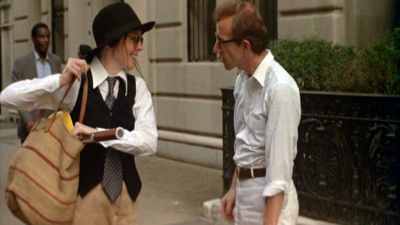
You can count the number of comedic films to win “Best Picture” on two hands and this one is, arguably, the best of the lot (unless you want to debate “The Apartment,” which I could understand). I look at it like this – people bitch and complain that Stanley Kubrick, Charles Chaplin, Alfred Hitchcock, Howard Hawks & Robert Altman never won an Oscar. Fine. The same would be said for Woody Allen if one of his movies never took home the golden statue. “Really? How could that be possible?! He never won after all those great movies?” Now, of course, if you’re not a Woody fan, you won’t like this selection, but I had to find room for it. It is one of the all-time greatest comedies, and stands as the seminal turning point in the filmmaker’s career. Diane Keaton created one of film’s greatest screen characters (“Lah-di-dah”), and the chemistry between the two is a marvel, and tremendous fun to watch. A classic love story filled with some of Woody’s greatest one-liners (“I don’t want to move to a city where the only cultural advantage is being able to make a right turn on a red light”), there are also moments of great drama and depth. I know “Star Wars” nuts think that their film got robbed. I understand that it was a ground-breaking film, and changed the way movies were made. When a comedy wins, most don’t find it deserving. I like “Star Wars” very much, but to me, it looks a bit dated now, and perhaps that’s because special effects has grown by leaps and bounds. I just know “Annie Hall” (which I believe is his 2nd greatest movie) will be looked at as one of cinema’s greatest comedies decades from now. It also doesn’t sell out at the end and gives a realistic portrayal of a relationship gone sour. I can watch this anytime, anywhere…so it makes the list.
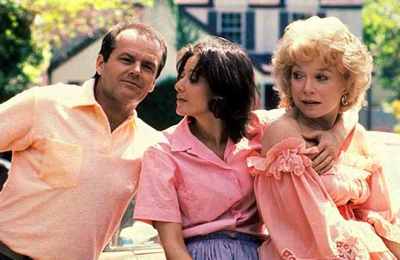
I think James L. Brooks is one of the finest, most clever screenwriters we have, and there are usually about 10 classic lines in each of his best works. Here, after years of writing successfully for television, he made his directorial debut and, after winning 5 Oscars, has become a modern-day classic. I know many poo-poo this movie, though I am not sure why. Perhaps because it is overly sentimental and falls under the genre of “tear-jerker,” but I think that’s just silly. It’s a beautifully woven story, with rich and fascinating characters. I love that it always makes me cry when Emma (Debra Winger) has to say good-bye to her two sons, or when her mother, Aurora (Shirley MacLaine), is screaming for someone to help medicate her daughter. The chemistry between Jack Nicholson (as the vain ex-astronaut turned playboy, Garrett) and MacLaine is so strong and they are simply a delight to watch. Their first date is one of the great screen dates, and Jack gets to do his thing throughout, which is enjoyable to watch. But even he goes through a maturation process that leaves the viewer quite moved. The core of this film, however, rests in the mother-daughter relationship, which is funny, conflicting, heart-breaking…the stuff of real life. Brooks gets top supporting performances from a young Jeff Daniels (what a cad!), Danny DeVito and John Lithgow. The movie strikes the ideal balance between comedy and drama, and flows into one another so effortlessly. I find this to be such a charming, slice-of-life film. You’ve heard the old adage, “I laughed, I cried.” Each time I watch this movie, I find it to be the epitome of that very saying.
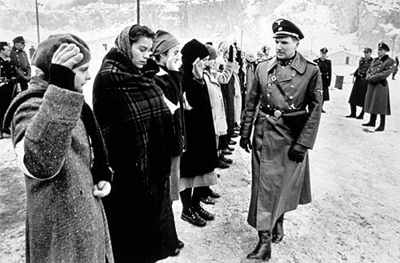
Simply put, a glorious piece of filmmaking. Splendid cinematography by Janusz Kaminski, a stirring score by John Williams and Michael Kahn’s adept editing help create this engaging and important work of art. I have not read the Keneally book (though most of my students have), but Steven Zaillian’s screenplay brings this chilling and inspiring true story to life in such a skilled, crafted way. There are many films focused on the Holocaust, and though this may not be my favorite one, it is surely the one that most people point to as being the quintessential “Holocaust film”. Liam Neeson plays Oskar Schindler, who starts off as a vain and avaricious businessman, who uses the Jews as cheap labor to start a factory in Poland during WW II. Slowly, he begins to see first-hand, the horrors endured by the Jews, and begins a quest in trying to save as many lives as possible. In the end, he composes a list of over 1,100 Jewish people who he rescued from death. I know there is a lot of praise & glorification being thrown around throughout this list, but that is because these are 10 magnificent films that stand out among, literally, thousands. Here is one statement though that is in no way hyperbole — Ralph Fiennes, in bringing to life Amon Goeth, created (in my estimation) the most vile screen villain ever put on film. In Goeth, we witness the true evil a human being is capable of. He is terrifying, unpredictable and oh-so genuine. He wants so desperately to be admired and liked, as Schindler is; the way he looks at himself in the mirror, the clumsy manner in which he tries to “pardon” a Jew that he so desperately wants to kill, the blunt manner in which he shoots another human being…Fiennes does it all with impeccable authenticity. The film didn’t have much competition that year, but I don’t think it really matters. No matter what movies were released that year, Spielberg’s movie (winner of 7 Oscars) was taking home the grand prize…it’s that remarkable an achievement.
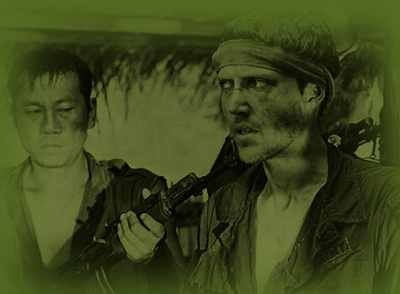
One of the great war films ever made, Cimino’s epic examines the lives of three close friends, all working-class factory workers in Pennsylvania, who decide to enlist in the Army during the Vietnam War. Before they go, Steven (John Savage) marries his pregnant girlfriend and the first act of the film shows us the wedding, which also serves as a farewell party for the bridegroom and his friends Michael (Robert DeNiro) and Nick (Christopher Walken). I know many people find this part of the film to be a bit slow and lengthy, but I take the glass-half-full approach and say that Cimino and screenwriter Deric Washburn do an incredible job in developing their 3-dimensional characters. Plus, a lot of what is here is essential when you get further into the movie. The second act picks up, and we are thrust into a prisoner-of-war camp where the three friends are detained in nightmarish conditions. The final act shows the horrific effects that war has on people and their surroundings. The film is graphic, daring, sincere and deeply affecting. Wonderful performances all around. A young Meryl Streep is so good here (a real shock, right?); sometimes she doesn’t even speak a line and we know exactly what she is thinking. This is also when DeNiro and Walken weren’t just cashing checks and really immersed themselves in their craft — and both are spectacular here. A shell-shocked Walken in the hospital trying to answer what his name is — or those haunting Russian roulette scenes are images that I have yet to forget since I first watched this film. “The Deer Hunter” shows us a quaint small town in America, the merciless horrors of war and the daunting effects that it has on the people who served and those who are close to them. A 5-time Oscar winner (beating out “Midnight Express“), it remains one of the most powerful films ever made.
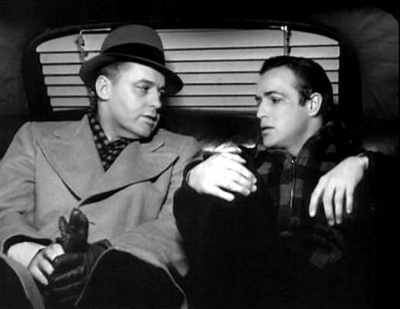
Winner of 8 Academy Awards, “On the Waterfront” is one of the greatest American film ever made. Having been nominated for “Best Actor” the previous three years, Marlon Brando finally won his first Oscar in his fourth consecutive year, being nominated playing Terry Malloy, an ex-prizefighter turned longshoreman who witnesses a murder and struggles with himself to stand up to a corrupt union boss (a terrific Lee J. Cobb). Watching Brando’s transformation of this character is something to behold. Like something out of an Arthur Miller play, Budd Schulberg’s screenplay is authentic, powerful and enduring. On top of the flawless performance by Brando, Rod Steiger, Karl Malden and Eva Marie Saint turn in moving performances as well. The controversial film does not seem to have aged at all either, though the politics of the time may not be the same as today, especially in the aftermath of HUAC and Kazan’s highly publicized “naming of names”. It has been said that Brando didn’t even want to work with Kazan after he named the names of some of his close friends. Thank God he chose to do this. Close friends and collaborators, Miller and Kazan always wanted to do a film together covering the corruption on the docks – but never got to after HUAC. Miller did “The Crucible” and here, Kazan answers back with a statement of his own in this brilliant piece of filmmaking.
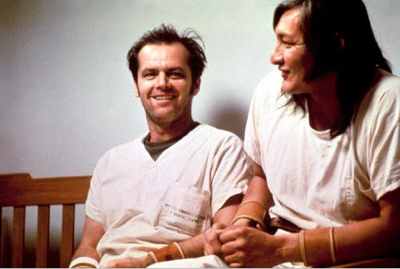
Milos Forman’s powerful, disturbing and, at times, humorous film is a brilliant adaptation of the Ken Kesey novel. Jack Nicholson has been outstanding in so many roles, but this may be his very best work to date. Here, he plays the rebellious Randle P. McMurphy, who is serving time at a state mental hospital and instantly tries to challenge all authority. In doing so, he tries to recruit the other patients to take on the dictatorial rule of Nurse Ratched (Louise Fletcher), who is more despot than nurse. Every time he tries to have a little harmless fun (playing cards, watching the World Series), he is stopped by this oppressive woman. This film is a modern classic, featuring great supporting performances by Danny DeVito, Christopher Lloyd, Ted Markland and Vincent Schiavelli. Brad Dourif is painful to watch as Billy Bibbit, who is terrified of Nurse Ratched and the haunting image of his mother (who we never see). Fletcher is perfect in this role and creates one of cinema’s most despicable characters ever. Every note she hits is just right, and her toe-to-toe scenes with Nicholson are akin to watching two heavyweights battle it out. McMurphy’s scenes with Chief Bromdom are also a treat to watch. The symbolism of McMurphy as a Christ-like figure, though more perceptible in the novel, are still quite evident here, albeit in more subtle fashion. What starts out as McMurphy trying to get out of work and prison by pretending to be insane, slowly morphs into something dark, perverse and terribly unsettling as he begins to win over the patients one by one. Forman manages to hit so many notes here, and just when things seem to be jubilant and hopeful, it all crashes down and your stomach is in knots. The film had pretty fierce competition for the “Best Picture” prize and was the first to win the 5 ‘major’ Oscar awards since 1934 and, in viewing it, you can easily see why.
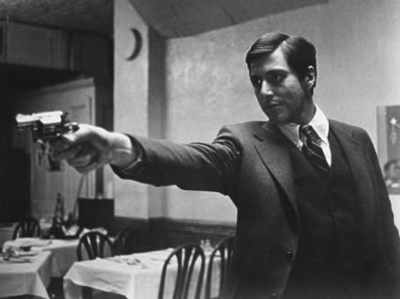
This could just as easily be #1 on this list as I find it the second best film ever made. Coppola’s masterpiece lost out to “Cabaret” in a number of categories, but thankfully, it took home the one Oscar that mattered. Marlon Brando, back at the top of his game. Exceptional performances by Robert Duvall, Diane Keaton, James Caan, and Talia Shire. The coming out of Al Pacino, playing one of the most complex characters in movie history in Michael Corleone, the dutiful war-hero son turn immoral Don. I have seen this film more times than I care to mention and it never gets dull to me for a second. A young Coppola handles this film with such subtlety and such grace, showing audiences the inner workings of a mafia family before “The Sopranos” and others of its ilk romanticized it to the point of being cartoonish and false. The Corleone family, on the other hand, rings quite authentic. The transformation of Michael is mesmerizing to watch; Brando meeting with the heads of the five families after declaring that the war stops here; the infamous horse head under the sheets; Carlo finally paying for Sonny…I can go on and on with another thirty or forty moments and it won’t be enough. An iconic film score, a great screenplay adaptation and glorious cinematography by the legendary Gordon Willis help make this a film you simply can’t refuse.
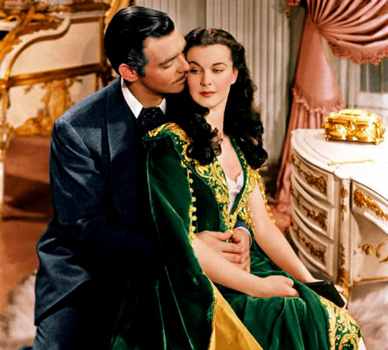
I watch this film and cannot believe that this was made 71 years ago. What a gorgeous piece of filmmaking this is – a grand achievement on such an epic scale. When you think of “classic” films, this must surely be one of them. And still, to this day, it remains the #1 box-office success when you adjust for inflation (besting “Star Wars,” “E.T.,” and “Titanic” among others). Here, we are given Vivien Leigh in one of film’s most iconic roles, doing a masterful job as Scarlett O’Hara. We witness her epic tale through one of the most turbulent periods in this nation’s history. She is truly one of cinema’s most enduring characters, as she goes through so many transformations in her life – and Leigh pulls it all off seamlessly. On top of her duties to the Tara plantation, we watch the love story between her and Rhett Butler (Clark Gable), an immortal story in itself. The film gives us so many classic lines that we all know by heart, and never ceases to feel new and timely. Many would probably put this as #1, and I couldn’t call them crazy. On top of being such a fantastic film, look at the competition it beat out in 1939! I don’t think there has been a stronger list of nominees since: “Stagecoach”, “The Wizard of Oz”, “Dark Victory”, “Mr. Smith Goes to Washington” and “Of Mice and Men” are just a few, and these are all unbelievably great movies. What do they say? “They don’t make ‘em like they used to.” Sometimes I think they’re right.
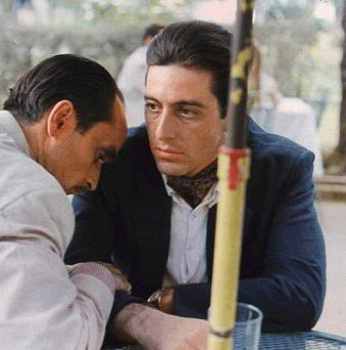
For my money, the finest American film ever made. How many sequels can you say are just-as-good, if not better, than the first? Not many at all. I believe this one actually outdoes the masterpiece released in 1972 (though by only a very slim margin). It also beat out stiff competition that year with terrific films such as “Chinatown”, “Lenny” and “The Conversation”. I love the backstory of young Vito Andolini coming to Ellis Island and his rise to becoming Don Corleone, which includes the assassination of Don Fanucci. The Little Italy scenes showing us a mesmerizing Robert DeNiro (as the young Don) taking on all of the subtle nuances of Brando are a pleasure to watch. Meanwhile, we watch as the character of Michael (Al Pacino in perhaps his greatest performance) sinks deeper and deeper into the bowels of evil, while tightening the grip on his crime family in Las Vegas. Coppola had so much to lose here, but more than delivers and the performances, again, are extraordinary. The late John Cazale gets more screen-time as Fredo (poor Fredo – “I know it was you, Fredo. You broke my heart”), the legendary acting teacher Lee Strasberg makes his screen debut as Hyman Roth, and we are also given terrific supporting performances from Michael Gazzo and Bruno Kirby. A wonderful job of storytelling here and I catch something new each time I watch it. This was a no-brainer #1 for me because I haven’t seen a better film so far and, thankfully, it took home 6 Oscars, including “Best Picture.”
P.S. — My apologies to “Midnight Cowboy”, “All About Eve”, “Braveheart” and “From Here to Eternity” — all remarkable 4-star films in my book, and all deserving of winning the coveted Best Picture Oscar. As I said in my intro, I wish there was room for all of them. I just couldn’t omit the ten that you see above.



